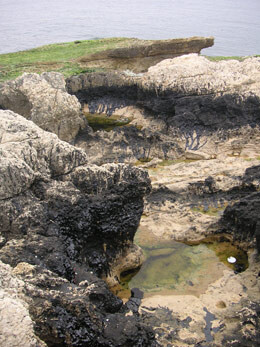Electronic Lebanon 14 May 2007

Oil coats rocks and oozes into pools on the northern Lebanese coast, nine months after the spill occurred. (Lucy Fielder/IRIN)
Israel bombed an oil refinery in Jiyyeh, south of Lebanon’s capital, Beirut, during its conflict with the armed wing of Lebanese political party Hezbollah last July. The bombing caused the refinery to spew an estimated 10,000 to 15,000 tonnes of fuel oil into the Mediterranean Sea. It was Lebanon’s worst environmental disaster, say environmentalists.
“Summer is coming and this oil is melting,” said Mohammed Sarji, head of the Lebanese Divers’ Union and head of the clean-up operation along the southern coastline that is being conducted by NGO Bahr Loubnan (the Sea of Lebanon). “Temperatures will rise and we could end up with a river of oil going into the sea.”
Sarji said oil that liquefies could form a film on the sea, threatening marine life such as turtles and dolphins, or it could wash back up. “It’s not healthy, people should not be in contact with petroleum derivatives. If it gets on children going swimming this summer, that’s terrible.”
Environmentalists also urgently want the government to remove at least 3,000 tonnes of collected oil in plastic bags and barrels along the coast. In summer it will liquefy, they say, and the containers may split, contaminating the sea or ground.
Ghada Mitri of the Ministry of Environment said those who cleaned up should transport the oil with ministry support where needed.
Pain-staking manual clean-up
Bahr Loubnan has cleaned underwater along the whole coast from Byblos to the south, including around Jiyyeh. Sarji said this pain-staking manual clean-up, which has so far cost the NGO US $400,000, was mostly finished but was ongoing where changing tides exposed oily patches.
US state development agency USAID awarded a US $5 million contract to US company Seacor Environmental Services to clean roughly 60km of shore north of Byblos. Lebanon’s Environment Ministry oversaw the work.
In January, a USAID press release said the job was done, but Lebanon’s Ministry of Environment clarified that “phase one” was completed - the removal of free-floating oil and oil in danger of going back into the sea.
“It is planned by the Ministry of Environment that phase two - the cleanup of rocky platforms and walls of wharfs and revetments to a higher level of cleanliness in some sites along the coast, if resources are made available to Lebanon - be initiated as soon as the sea and weather permit,” the government statement said.
In Byblos today, clumps of oil still stick to a public beach and barrels of oil, greasy sand and pebbles are piled up next to a hill of dirty sand.
“The clean-up in this area was badly done and must be finished,” said Fifi Kallab, head of local NGO Byblos Ecologia. “People cannot go into the sea in many places, which will hurt tourism.”
The Lebanese are counting on a good tourism season this summer to help compensate for last year’s, which saw an exodus of foreigners and locals because of the war.
USAID’s Sana Saliba said the ministry had asked them to wait for an April coastal survey to be completed before starting the next phase, which would be sub-contracted to Lebanese companies. “The idea was also to let nature do some of the work, mostly on the rocky beaches,” Saliba said. “This is normal clean-up practice.”
Bahr Loubnan clean-up supervisor and local resident Raif Nader said many beaches in the area had not been touched. “They didn’t do anything here. USAID told us Mother Nature would wash the rocks. Why does it cost $5 million just to let it wash back out to sea?”
This item comes to you via IRIN, a UN humanitarian news and information service, but may not necessarily reflect the views of the United Nations or its agencies. All IRIN material may be reposted or reprinted free-of-charge; refer to the copyright page for conditions of use. IRIN is a project of the UN Office for the Coordination of Humanitarian Affairs.
